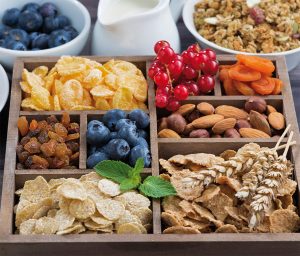Antioxidants’ Roles in Our Body

Antioxidants are compounds that the human body makes naturally. But you can also get antioxidants from different foods. They protect the human body against harmful molecules called free radicals. Free radicals may accumulate and cause oxidative stress. Oxidative stress unfortunately increases the risk of heart disease, cancers, type 2 diabetes and many other chronic diseases.
Fortunately, a diet rich in antioxidants can help neutralize free radicals and reduce the risk of these chronic diseases. Consuming different foods that were introduced in this article can help to strengthen the blood antioxidant level and bring many benefits to human health.
Dates
The antioxidant properties of Kurma Mazafati Seri kembangan prevent the occurrence of stomach ulcers; it also reduces the incidence of colon and stomach cancer.
Goji berry is a dried fruit of two closely related plants, named Lycium barbarum and Lycium chinense.
Goji berry is also very effective in increasing blood antioxidant levels. In one study, healthy elderly subjects consumed a milk-based goji berry drink every day for 90 days. By the end of this study, their blood antioxidant levels increased by 57%.
Goji berries are nutritious, but their constant consumption is expensive. In addition, few studies have been conducted on the effects of goji berries on humans. Although these few studies speak to the health benefits of goji berries, more human research is needed.
raspberry
Raspberry is a soft and sour berry that is often used in desserts. Raspberries are a good source of fiber, vitamin C, manganese and antioxidants. According to FRAP, every 100 grams of raspberry contains 4 mmol of antioxidants.
Several studies suggest that antioxidants and other compounds in raspberries reduce the risk of cancer and heart disease. Laboratory research shows that the anti-inflammatory and antioxidant properties of black raspberry can reduce and eliminate the effects of various cancers.
In addition, the antioxidants in raspberries, especially anthocyanins, help reduce inflammation and oxidative stress. This can reduce the risk of heart disease. It is said that most of the available evidence for the health benefits of raspberries comes from laboratory studies. Before there is a recommendation for its use, more studies should be done on humans.
Kale
Kale is a cruciferous vegetable grown from Brassica oleracea species. Kale is one of the most nutritious plants on the planet and is rich in vitamin K, vitamin A and vitamin C. It is also rich in antioxidants and there are 2.7 mmol of antioxidants per 100 grams.
Kale is also an excellent plant source of calcium; An important mineral that promotes bone health and plays an important role in other cellular functions.